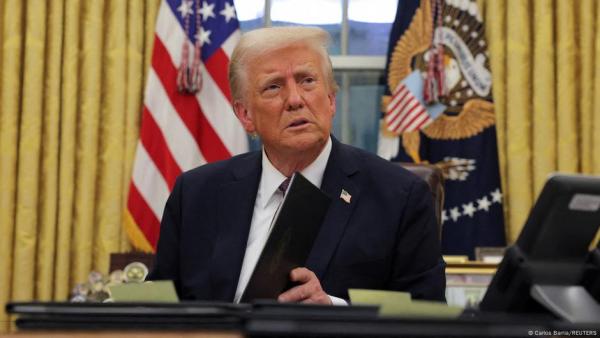

Under President Donald Trump's executive orders, nonbinary and transgender people in the United States will not have access to official documents matching their identities or protections against workplace discrimination.US President Donald Trump has had a busy first few days in office. He has signed more than 100 executive orders, directives the president can give to federal agencies and departments without having to consult Congress. Several of them were related to LGBTQ+ rights. During his inauguration speech, Trump announced that under his leadership the US government would only recognize two genders. This means that the government will not allow nonbinary and intersex people, who are neither male nor female, to have their identities reflected on their passports and other official documents. "It is the policy of the United States to recognize two sexes, male and female," the executive order Trump signed on day one of his second term reads. "These sexes are not changeable and are grounded in fundamental and incontrovertible reality." The order, titled "Defending Women From Gender Ideology Extremism and Restoring Biological Truth to the Federal Government," also makes clear that the US government does not recognize transgender people's identities any longer. Trump: 'False claim' "Across the country, ideologues who deny the biological reality of sex have increasingly used legal and other socially coercive means to permit men to self-identify as women and gain access to intimate single-sex spaces and activities designed for women," the presidential directive states. "This is wrong." It is a "false claim," according to Trump's executive order, that people born with a prostate could "identify as and thus become women and vice versa." There are about 1.6 million transgender people in the United States aged 13 and older, according to the Williams Institute School of Law at the University of California, Los Angeles. The American Medical Association (AMA) is in favor of facilitating gender-affirming health care, which is any medical care that helps people transition to the gender they identify with. Receiving this care is important for transgender people; the AMA states that such care "has been linked to dramatically reduced rates of suicide attempts [and] decreased rates of depression and anxiety." No more diversity, equity and inclusion initiatives Trump also signed an executive order to end all "diversity, equity, and inclusion" initiatives in federal departments and agencies. According to supporters, DEI programs ensure that underrepresented groups — be that based on race, gender or other markers — get a fair chance and equal treatment in the workplace. Opponents call DEI initiatives "immoral discrimination programs" and "public waste," as Trump's directive states. In addition to signing his own executive orders, the US president can also reverse those signed by his predecessor. Trump on the first day of his second term revoked a Joe Biden directive titled "Preventing and Combating Discrimination on the Basis of Gender Identity or Sexual Orientation." It ordered all federal departments to review and, if necessary, revise their policies prohibiting sex discrimination to make sure that they also banned discrimination against members of LGBTQ+ communities. This is no longer valid. What will the effects of Trump's executive orders be? Since 2022, US citizens were able to select X as a sex marker on their passports instead of M or F for "male" or "female." It is unclear as of yet what will happen with passports that currently have the X mark. But since only two genders are recognized by the Trump administration, people who identify as nonbinary or intersex will not be able to receive new documents that reflect that identity any longer. This can also be an obstacle to having their identity recognized elsewhere, for example at school or at work. Not recognizing transgender and nonbinary identities comes with a slew of consequences for the people affected. Trans people are now unable to change their sex on government documents to align their IDs with their gender identity. The order also puts a stop to the requirement at federal government workplaces that transgender employees be referred to by their preferred pronouns. Since the government will only recognize a person as being the gender they were assigned at birth, transgender women will be sent to men's prisons. And transgender employees at federal government departments and agencies will have to use the restrooms of the sex they were born with, not the one they identify as. All DEI officers at federal agencies and departments are on paid leave starting Wednesday as their initiatives will be shut down. The rescinding of Biden's executive order means that there is no regulation for employers distinctly stating that they cannot discriminate against employees with LGBTQ+ identities. This could include a transgender person trying and failing to get their employer to refer to them by the pronouns that match their identity, or someone being excluded from networking events because they wanted to bring their same-sex spouse. LGBTQ+ communities, allies appalled Though conservatives are seeing some of their wishes realized by Trump's executive orders, advocates for and allies of LGBTQ+ communities are appalled. They say that some of their hard-fought wins over the past few years are being rolled back, something they are not ready to accept. "We refuse to back down or be intimidated," said Kelley Robinson, president of the Human Rights Campaign, the largest LGBTQ+ rights advocacy group in the United States. "We are not going anywhere, and we will fight back against these harmful provisions with everything we've got." Sarah McBride, the first openly transgender member of Congress, is strongly opposed to the newly signed regulations stating that gender is a binary and unchangeable. "No executive action, no legislative action for that matter, can erase the reality of diversity across gender in our society," McBride, who represents Delaware in the House of Representatives, told US broadcaster NBC. Edited by: Milan Gagnon